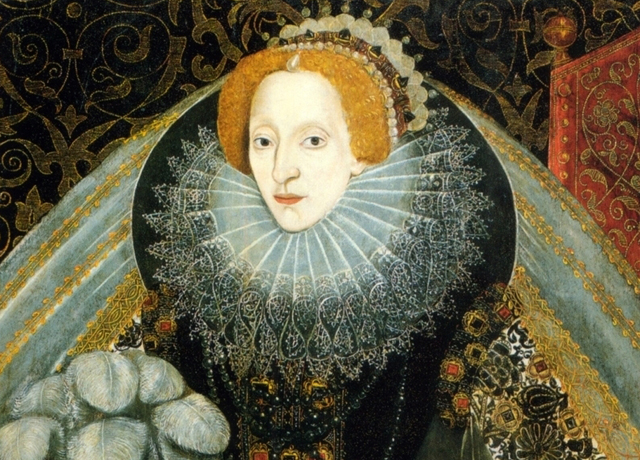
Whenever we’ve seen a character reappear in multiple cinematic treatments over the years, it’s usually a character out of fiction. Fictional characters, particularly from classic literature, enjoy long histories of successful reinterpretations partly because their adaptations merely have to stay true to the character while at the same time being a little more care free with their role in the story or their place of existence. That’s why we’ve sometimes seen Sherlock Holmes in modern day, or Robin Hood with an all animal cast, or even Romeo and Juliet as either arctic seals or garden gnomes. But, sometimes Hollywood returns time and again to a character of a different type; that of a real historical figure. Though not as common, we do sometimes see historical people interpreted in multiple films in many varied ways. Albeit, the uses of a historical character in a film is more restricted than that of a fictional character, considering that the real history behind the character has to be accounted for. But, whether they are the center of a true life story, or a background historical element in a work of pure fiction, it is interesting to see how some historical figures are portrayed in different ways on the big and small screens. It also takes a special, larger than life figure to make it into multiple cinematic treatments and that’s why great leaders and monarchs are the ones who usually turn up in so many movies. You can point to famous American presidents like Abraham Lincoln, or legendary commanders like Julius Caesar as historical figures who’ve turned up multiple times. But, the most common example of reoccurring historical characters in cinema would be historical kings or queen of Merry Old England, and none more so than the Virgin Queen herself, Elizabeth the First.
Queen Elizabeth I is one of history’s most revered monarchs, and her reign is considered one of the most pivotal in English history. The second daughter of Henry VIII, Elizabeth would rise to the throne in 1533 after the short but brutal reign of her half-sister Queen Mary, whom the Protestant rebels who opposed the Catholic monarch dubbed “Bloody Mary.”Elizabeth restored the Protestant reforms of her father as well as reconciled the religious rift in her country and rallied her people together against outside invading forces from France and Spain. All the while she became a strong patron of the arts and a savvy stateswoman, leading England into a long period of wealth, culture and prosperity that historians now dub “The Golden Age” of English history. But, beyond her amazing accomplishments, she is also a fascinating character and personality. She was forward thinking in many ways that few of her male peers we’re at the time, particularly in her interest of exploration of the recently discovered New World. Because of her, we have to this day a State called Virginia, named in her honor. In many ways, Elizabeth has made an ideal figure for classic romances, because few other woman have held as much power as her in history. That power dynamic she wields has made her an endlessly fascinating character in many films, and as such, I’ve chosen to highlight a few of her more notable appearances on the big and small screens and see how the iconic image of the Virgin Queen has evolved over the years on film.
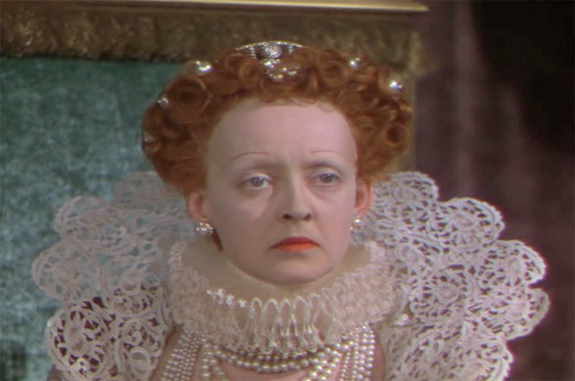
BETTE DAVIS in THE PRIVATE LIVES OF ELIZABETH AND ESSEX (1939)
This was the most notable portrayals of Elizabeth in the early days of cinema, and the filmmakers could not have found an actress better suited for the part than Ms. Davis. All-American Bette Davis may not have struck people today as the obvious choice to play the iconic English queen, but one only has to look at the finished product in the film and you’ll see her completely transformed. Lusciously directed by Michael Curtiz for Warner Brothers in beautiful Technicolor, The Private Lives of Elizabeth and Essex portrays the often tumultuous love affair between Elizabeth and the Earl of Essex (Errol Flynn). It’s an old-fashioned, but still engaging classic period drama, and Bette Davis is absolutely the crowning jewel of it all. She masters the regal-ness of the character, but at the same time explores her humanity in a captivating way. And the work she put into transforming herself into Elizabeth is remarkable. She actually had the make-up department shave off her eyebrows and part of her forehead in order to match the image of Elizabeth that we have from her portraits. Now that’s a commitment to a role that you’ll rarely find in classic Hollywood. Interesting enough, Bette Davis would return to the role of Queen Elizabeth many years later in the Cinemascope epic The Virgin Queen (1955). That film isn’t quite as passionate and introspective as this version, but Davis again doesn’t disappoint and the film is worth seeing just for her performance alone. Overall, for Elizabeth to become an iconic character in the early days of cinema, all Hollywood needed was to give the role to one of their ow reigning Queens, and it was a beautiful match indeed.
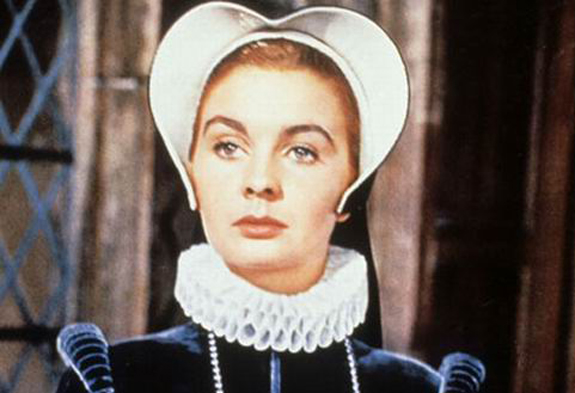
JEAN SIMMONS in YOUNG BESS (1953)
Taking an entirely different view on the life of Queen Elizabeth, Queen Bess portrays the early years of Elizabeth, showing her ascension from princess to reigning monarch. This film, however, is a little more “Hollywood” than previous versions of this story have been. By “Hollywood,” I mean that it tacks on an entire romantic subplot that has no basis in history. As Elizabeth grows into adulthood, she contends with a love triangle between her, the Queen Cathrine Parr(Deborah Kerr) and the dashing Sir Thomas Seymour (Stewart Granger). Suffice to say, this is purely fictional and has no basis in real history. Also, the reign of Queen Mary is completely ignored here; Elizabeth follows her brother Edward immediately in succession. But, despite the historical inaccuracies, the film does attempt to give Elizabeth a dignified portrayal. Jean Simmons is fine in the role, giving young Bess a sense of the weight of the responsibilities she must hold, while at the same time giving her the innocence of someone who has yet to carry the burden of her position. Her performance can sometimes feel a little too naive, but Simmons is not a bad actress by any means and she does do the image of the Queen a lot of honor. Not much is known of Elizabeth’s formative years, but Jean Simmons does portray a believable idea of what the one day Queen might have been like in that time. Also of note in this film is the casting of Charles Laughton in the role of Henry VIII; a character which he had won an Oscar for playing nearly 20 years prior in the Alexander Korda produced film, The Private Life of Henry VIII (1933).
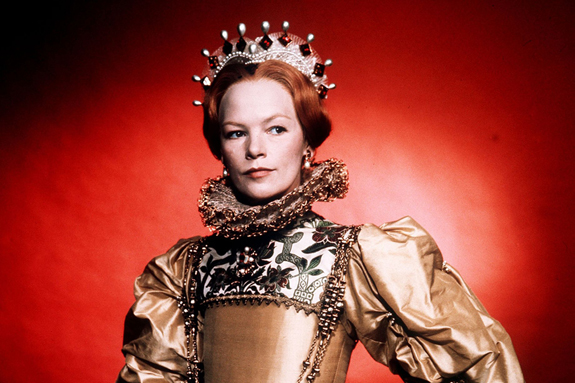
GLENDA JACKSON in ELIZABETH R miniseries (1971)
Elizabeth was a favorite figure for classic Hollywood, but of course her native country of England has also brought her story to life many times as well. Though there have been many British films centered around the life of Elizabeth I, perhaps the most ambitious and comprehensive of them all would be this BBC produced miniseries for television. Though lacking in the sumptuousness of a big screen production values, Elizabeth R more than makes up for it with it’s attention to the detail of the period and the people who inhabit it. And at the center of it all is two time Oscar-winning actress Glenda Jackson. Jackson may not be as well known to audiences today, but in the late 60’s and early 70’s, she was the “It Girl” of the time, winning numerous accolades and earning enormous respect from critics and audiences alike. And then, she walked away from acting completely, instead choosing to pursue a life in politics, which helped her towards a long career as a Member of Parliament. That political fervor that Glenda Jackson had in real life is well reflected in her portrayal of Elizabeth here. Elizabeth R shows the Queen at her most commanding, effectively showing us the true might that the real Elizabeth might have wielded during her reign. The lengthy production also gives us a complete portrait of Elizabeth’s life, both the highs and the lows. It’s an interesting production, and Glenda Jackson gives a captivating performance. Perhaps Jackson’s closeness to the character inspired where she would go next with her life, but if not, it’s a strong reminder of the power she had as a performer, which reflects well in the role of a Queen.
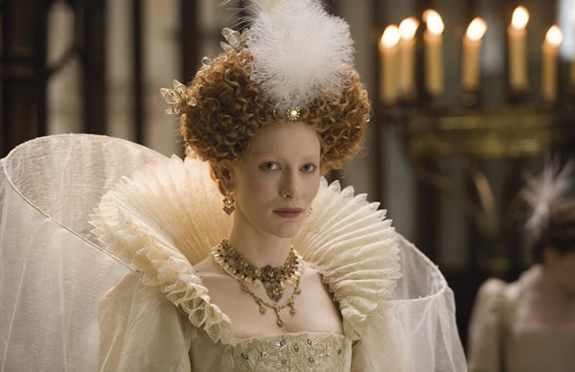
CATE BLANCHETT in ELIZABETH (1998) and ELIZABETH: THE GOLDEN AGE (2007)
Here we find the marriage between real history and cinematic pageantry fully on display. Directed by Indian born director Shekhar Kapur, Elizabeth and it’s sequel attempt to portray the life of the Queen with an emphasis on it’s visuals. These are some very beautiful movies, photographed by British cinematographer Remi Adefarasin, but at times the visuals become a little too showy and distract from the drama that’s supposed to be grabbing our attention; this is more true in the sequel than the original. Had the central role of Elizabeth been played by a less talented actress, this movie would have easily slumped into the “style over substance” category. Thankfully, the film has one of the best actresses of our time in the role. Cate Blanchett fits the role of Elizabeth like a glove and gives a commanding performance that stands out among all the pageantry. She justly was nominated for her performance in both movies, and her mastery of both the character and her place within this world are remarkable. Physically, she looks the part as well. With her sharp features and pale skin, it’s almost as if she’s walked right out of a portrait of the Queen itself. She also commands our attention through every regal speech she gives, playing the queen as both regal and aloof, depending on the situation she’s in. This was also the film that introduced the Aussie actress to the world at large, so we can be thankful for that. Had Cate not been a part of this film, I don’t think it would have worked out as well as it did, so it just shows how important it is to get the right actress for the part. For one of the more luscious productions set around the life of Elizabeth, with a truly great performance at it’s center, this will be one to seek out.
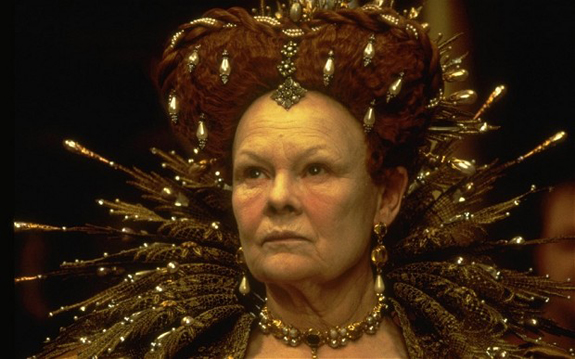
JUDI DENCH in SHAKESPEARE IN LOVE (1998)
Released in the same year as Cate Blanchett’s Elizabeth, we find a film with an entirely different take on the famed Queen. Here we find a portrayal of Elizabeth in her latter years, slowed down by age, but no less intimidating in her command over her subjects. The movie of course is more centered around the life of William Shakespeare (played here by Joseph Fiennes) and is a largely fictional tale about a private romance between the Bard and a noble maiden (Gwyneth Paltrow) that inspired the writing of Romeo and Juliet. Now, some have argued that this movie unfairly robbed Saving Private Ryan of the Best Picture Oscar, and I’m not going to lie, I find myself in that camp too. This film is delightful and entertaining, but Best Picture worthy? I don’t think so. What is less arguable though is the praise given to the portrayal of Queen Elizabeth in this movie, brought to vivid life by the great Dame Judi Dench. Dench appears in only seven minutes total in the film, but my God does she make the most of those seven minutes. Her Elizabeth is a force of nature, both intimidating and alluring all at the same time; and also surprisingly funny. I especially love a bit in the movie where she waits for the men of her court to lay down their cloaks over a puddle for her to walk over, but then she gets impatient and walks across anyway, yelling back at them “too late.” Dench deserved her Oscar for the role, and the movie is blessed with her presence. She perfectly portrays the image of a Queen who has the experience behind her and the knowledge of how to wield power, and she steals every scene she’s in.
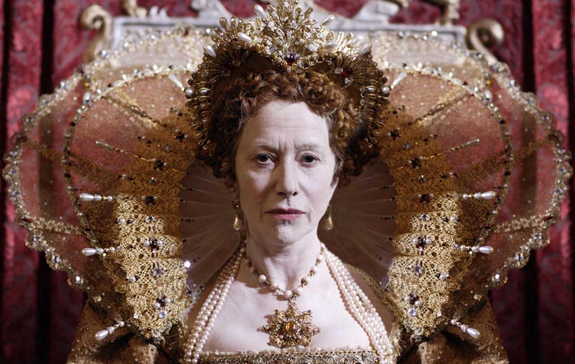
HELEN MIRREN in ELIZABETH I miniseries (2005)
Helen Mirren holds the unique distinction of having played both Queen Elizabeths in her career. She won an Oscar for her portrayal of Elizabeth II in Stephen Frears’ The Queen (2006), and she played Elizabeth I here in this joint BBC/HBO production, directed by Tom Hopper of The King’s Speech (2010) fame. This miniseries portrays the queen in middle age, focusing mostly on two private affairs that shaped her life during this period; those being the one’s she had with the Earl of Leicester (Jeremy Irons) and the Earl of Essex (Hugh Dancy), who ultimately betrayed her. What this miniseries manages to accomplish is to show the influence that Elizabeth’s private life had on her ability to govern, showing the way it built her character. Mirren of course is more than capable of assuming the role, and perhaps more than any actress before her, she managed to convey the person that Elizabeth was, rather than just capture her image. Bette Davis and Cate Blanchett commanded in the role before, but their performances tended to be in service to the pageantry. Here the pageantry takes a back seat to the performance, and Helen Mirren creates a vivid portrait of a woman burdened by the responsibilities of her position and how that takes a toll on her over time. This miniseries gives the best sense of how Elizabeth’s daily life might of been, and how the necessities of her duty as ruler often conflicted with her desires as a person, and how that conflict would sometimes lead her astray. Naturally, one of England’s greatest modern actress could so effectively find the woman behind the icon, and Helen Mirren’s performance as Elizabeth I is one of the most natural we’ve seen.
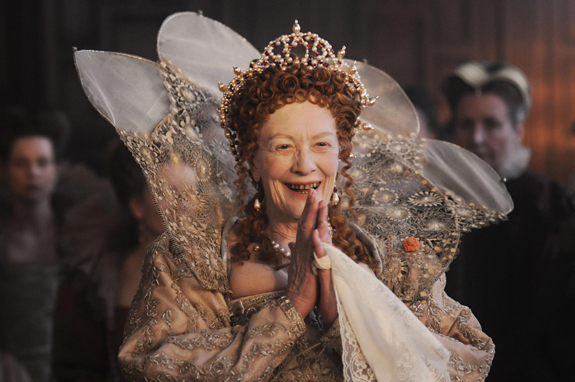
VANESSA REDGRAVE in ANONYMOUS (2011)
This portrayal of the famed Queen is one of the more problematic, not to mention one of the most insulting to history. Anonymous is a portrayal of the conspiracy theory espoused by the Anti-Strattfordian movement that claims that William Shakespeare didn’t actually write his plays, and that the true author was a nobleman by the name of Edward de Vere, Earl of Oxford. Naturally, a tale about Shakespeare would involve Queen Elizabeth in some way (given her patronage of Shakespeare’s work during that time), and this movie makes the ludicrous claim that not only was Edward de Vere (played by Rhys Ifans) a bastard child born from Elizabeth, but that he would go on to unknowingly have an incestuous relationship with her many years later. Yeah, it’s that kind of movie. The film was directed by disaster movie king Roland Emmerich, and it’s about as unsubtle and factually reckless as his blockbusters like 2012 (2009) and The Day After Tomorrow (2004). But, perhaps the film’s greatest fault is how it trashes these real historical figures in service of a bogus narrative that purely exists to indulge this insane conspiracy theory. And worst of all, it wastes the talents of a legendary actress like Vanessa Redgrave. Here we find Elizabeth at her most corrupt and lecherous. This is by far the ugliest portrayal of the Queen, showing her as a creepy old woman blind to the sins of her past. Vanessa Redgrave can do a whole lot better, and could have given Elizabeth a more dignified portrayal, even as a corrupt monarch. Sadly, this movie gives her nothing to work with, other than to indulge the lunacy of the director’s theories, and it is by far the last place where you’ll find a fitting portrayal of the iconic Queen.
Whether she has been the subject of a true, historical retelling, or part of the background in a work of complete fiction, Elizabeth I has held an interesting place in cinematic history. What I find interesting about all these different versions is that the role of Queen Elizabeth has belonged almost exclusively to the best actresses throughout film history. From Bette Davis, to Glenda Jackson, to Cate Blanchett and to Helen Mirren, each one is regarded among the best in their class. In fact, of all the actresses I highlighted, only one of them had never won an Academy Award in her lifetime (Jean Simmons). Some of these performances stand out more than others; Bette Davis is the showiest of the bunch, while Cate Blanchett and Helen Mirren are the more intimate. And Judi Dench’s portrayal in Shakespeare in Love is in a realm all it’s own. I also think that those interested should check out Glenda Jackson’s work in Elizabeth R; it’s a little drier than the rest, but no less fascinating. Part of why we love the presence of Queen Elizabeth in the movies of course is because of the performers playing the part, but it’s also because Elizabeth remains a fascinating figure to this day. Not only was she a unique player in history (a Queen who wielded enormous influence at a time when few women were allowed positions of power), but her legacy would define the period that she lived in. All these portrayals do an acceptable job of portraying the woman behind the icon (except Anonymous, but that’s not Mrs. Redgrave’s fault). Hopefully future portrayals continue to delve deeper into this historical tale and make the legendary Queen come alive once again.